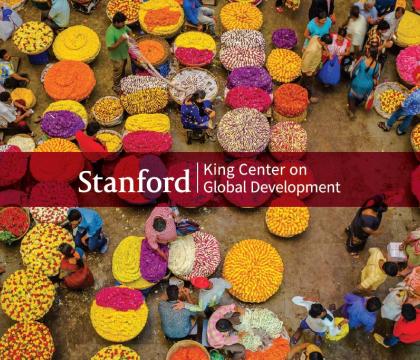Summer 2024 King Center Research Project "Effects of concrete floors on maternal and child health"
The King Center on Global Development's Summer Undergraduate Full-Time Research Assistant Program offers opportunities for fieldwork and research experience to matriculated, Stanford, undergraduates interested in global poverty and development across all academic disciplines.
When Stanford University travel policies allow, selected students spend up to 12 weeks in a low- or middle-income country conducting full-time research for a King Center faculty affiliate. Each research assistant receives a stipend of approximately $7,500 that covers most associated costs including travel, lodging, and incidental expenses. Should travel not be permitted and the research is conducted remotely (from within the US), the base stipend will be approximately $5,500. Financial aid of up to $1,500 is also awarded to students who qualify.
Students are welcome to apply to multiple opportunities but must apply to each faculty research project separately. Students may only accept one project if they are offered multiple opportunities.
If you have problems submitting your application, please report issues through the SOLO platform with a screenshot that includes the URL and the full page. Please email kingcenter_programs@stanford.edu to also let us know of your issue(s).
RESEARCH PROJECT SUMMARY:
Soil-transmitted helminth infections and diarrhea are responsible for a large burden of morbidity and mortality among children under 5 years and are associated with increased growth faltering, anemia, impaired child development, and mortality. Observational studies have found that children in households with concrete floors have a lower prevalence of diarrhea and soil-transmitted helminth infection than those in households with soil floors. However, these findings may be strongly confounded by household wealth. We are conducting a randomized trial in rural Bangladesh to measure whether installing concrete floors in households with soil floors reduces child enteric infection. We will randomize 800 eligible households with pregnant women and install concrete floors before the birth cohort is born. We will collect follow-up measurements when children are ages 6, 12, 18, and 24 months. Our team is comprised of experts in environmental and infectious disease epidemiology, including Bangladeshi scientists. Aim 1 is to measure the effect of household concrete floors on child soil-transmitted helminth infection and diarrhea. The primary endpoint is Ascaris lumbricoides prevalence at any follow-up measurement. Secondary endpoints include prevalence of other soil-transmitted helminths and diarrhea. Other outcomes include maternal quality of life and stress. Aim 2 is to measure the effect of household concrete floors on household fecal contamination and child soil contact and ingestion over time. This trial will determine whether concrete floors reduce enteric infection, and investigate mechanisms for how floors impact health, or if they do not, why. Household concrete floors are an innovative potential health intervention that may have additional benefits that we will measure in this study, including reducing the bandwidth tax that low-income families experience by making it easier to maintain a hygienic home environment, and in turn improve quality of life. Our findings will provide rigorous, policy-relevant evidence about whether concrete flooring installation should be delivered as a public health intervention to reduce child enteric infection.
Research mentor: Professor Jade Benjamin-Chung
Dates: A minimum of ten consecutive weeks during summer quarter 2024.
WHAT YOU WILL DO:
The research assistant will work closely together and in collaboration with the research team to:
Clean and process data from field surveys and laboratory analyses
Generate maps of the data from the study
Contribute to data quality assurance
- Clean and process data from field surveys and laboratory analyses
- Generate maps of the data from the study
- Contribute to data quality assurance
- Stanford undergraduate students in good academic standing, and planning to return to Stanford in autumn 2024, are eligible to apply (co-terms in graduate tuition status are ineligible)
- All majors are welcome
- Strong research and writing skills
- Must have good interpersonal skills and an ability to adapt well to cross-cultural contexts
In addition, specific qualification requirements:
- Experience in R and Excel
- Experience in Stata (optional)
Time Commitment:
- All research assistants are required to work full time, i.e., 35-40 hours per week for a minimum of 10 consecutive weeks during the summer quarter
To Apply:
Along with the application, applicants are asked to submit a resume or CV, and a Stanford transcript.
Please also answer:
- What experience do you have with data cleaning, data visualization, and statistical analyses?
- What coding language(s) do you have experience with?
For questions regarding this opportunity, please contact:
